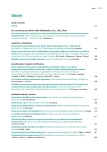-
Medical journals
- Career
Personalized pharmacotherapy of digoxin
Authors: Milan Grundmann 1; Ivana Kacířová 1,2
Authors‘ workplace: Ústav klinické farmakologie LF OU Ostrava, přednosta doc. MUDr. Milan Grundmann, CSc. 1; Oddělení klinické farmakologie Ústavu laboratorní diagnostiky FN Ostrava, primářka MUDr. Ivana Kacířová, Ph. D. 2
Published in: Vnitř Lék 2015; 61(5): 406-409
Category: Original Contributions
Overview
Introduction:
Therapeutic and toxic effects of digoxin are related to its serum concentrations, recent evidence suggests that a lower therapeutic range 0.5–0.9 ng/ml is associated with reduced mortality.Aim:
To show the advantages of therapeutic drug monitoring for dosing of digoxin.Method:
Trough serum levels of digoxin were estimated by immunoassay MEIA (AxSym Abbott). The long term serum concentration – time profile of digoxin has been predicted by the Bayesian analysis computer program MW-Pharm 3.30 MediWare.Results:
Sex case reports of the patients between 71 to 92 years are presented to show the different doses to receive digoxin levels in the therapeutic range. The doses varies between 0.03–0.25 mg per day.Conclusion:
Therapeutic drug monitoring is very usefull for prediction of serum level of digoxin. There is no need to wait for a steady-state condition before performing therapeutic drug monitoring.Key words:
digoxin – chronic heart failure – personalized pharmacotherapy – therapeutic drug monitoring
Sources
1. Digitalis Investigation Group. The effect of digoxin on mortality and morbidity in patients with heart failure. N Engl J Med 1997; 336(8): 525–533.
2. Rathore SS, Curtis JP, Wang Y et al. Association of serum digoxin concentration and outcomes in patients with heart failure. JAMA 2003; 289(7): 871–878.
3. Ahmed A, Waagstein F, Pitt B et al. Effectiveness of digoxin in reducing one-year mortality in chronic heart failure in the Digitalis Investigation Group trial. Am J Cardiol 2009; 103(1): 82–87.
4. Gheorghiade M, van Veldhuisen DJ, Colucci WS. Contemporary use of digoxin in the management of cardiovascular disorders. Circulation 2006; 113(21): 2556–2564.
5. Gheorghiade M, Ferguson D. Digoxin. A neurohormonal modulator in heart failure? Circulation 1991; 84(5): 2181–2186.
6. McMurray JJ, Adamopoulos S, Anker SD et al. ESC Committee for Practice Guidelines. ESC Guidelines for the diagnosis and treatment of acute and chronic heart failure 2012: The Task Force for the Diagnosis and Treatment of Acute and Chronic Heart Failure 2012 of the European Society of Cardiology. Developed in collaboration with the Heart Failure Association (HFA) of the ESC. Eur Heart J 2012; 33(14): 1787–1847.
7. Yancy CW, Jessup M, Bozkurt B et al. 2013 ACCF/AHA guideline for the management of heart failure: a report of the American College of Cardiology Foundation/American Heart Association Task Force on practice guidelines. Circulation 2013; 128(16): e240-e327. Dostupné z DOI: <http://doi: 10.1161/CIR.0b013e31829e8776>.
8. Špinar J, Vítovec J, Hradec J et al. Doporučený postup České kardiologické společnosti pro diagnostiku a léčbu chronického srdečního selhání, 2011. Cor et Vasa 2012; 54(3–4): 161–182.
9. Kakumoto M, Takara K, Sakaeda T et al. MDR1-mediated interaction of digoxin with antiarrhythmic or antianginal drugs. Biol Pharm Bull 2002; 25(12): 1604–1607.
10. Ehle M, Patel C, Giugliano RP. Digoxin: clinical highlights: a review of digoxin and its use in contemporary medicine. Crit Pathw Cardiol 2011; 10(2): 93–98.
11. Grundmann M, Kacířová I. Význam TDM, fenotypizace a genotypizace pro správné dávkování léčiv. Čas Lék Čes 2010; 149(10): 482–487.
12. Grundmann M, Kacířová I. TDM digoxinu v klinické praxi. Kardiol Rev Int Med 2015; 17(1): 65–69.
13. Alušík Š, Paluch Z, Lejsková M et al. Neuropsychiatrické projevy u intoxikace digoxinem. Klin Farmakol Farm 2009; 23(4): 162–165.
14. Kacirova I, Grundmann M, Halvova P. TDM of digoxin and theophylline as an indicator of the quality of medical care in University Hospital Ostrava – results of the 5-years monitoring. Abstract of IATDMCT European Therapeutic Drug Monitoring – Personalised Pharmacotherapy Conference, August 28–30, 2014, Prague: S101.
15. Kongkaew C, Sakunrag I, Jianmongkol P Non-compliance with digoxin in patients with heart failure and/or atrial fibrillation: a systematic review and meta-analysis of observational studies. Arch Cardiovasc Dis 2012; 105(10): 507–516.
Labels
Diabetology Endocrinology Internal medicine
Article was published inInternal Medicine

2015 Issue 5-
All articles in this issue
- Effect of spironolactone in patients with heart failure and preserved left ventricular function – TOPCAT study
- New version of classification of pulmonary hypertension
- Hypertension in females
- The effect of adding phytosterol to hypolipidemic therapy with statins on the size of lipoprotein particles in patients with very high cardiovascular risk
- White-coat hypertension and masked hypertension
- Personalized pharmacotherapy of digoxin
- Controversies accumulated around betablockers
- Is there a need to treat atrial fibrillation aggressively?
- The role of uric acid and allopurinol therapy in cardiovascular disease
- Outpatient treatment of venous thromboembolic disease
- The current state and future of care of patients with congenital heart defects
- Inhibition of renin-angiotensin-aldosterone system in heart failure, or from CONSENSUS to PARADIGM-HF
- Hemocoagulation – New views on the old cascade
- Primary hyperaldosteronism: problems of diagnostic approaches
- Neuro-cardiology or cardio-neurology – a new specialization of the future?
- Pheochromocytoma – why is its early diagnosis so important for patient?
- In what extend we can reach the current LDL-cholesterol treatment goals in secondary prevention
- What may cause diabetes
- Hyperosmolar hyperglycemic state
- Combination treatment of hypertension in 2015
- Internal Medicine
- Journal archive
- Current issue
- Online only
- About the journal
Most read in this issue- Hyperosmolar hyperglycemic state
- Hemocoagulation – New views on the old cascade
- The role of uric acid and allopurinol therapy in cardiovascular disease
- Hypertension in females
Login#ADS_BOTTOM_SCRIPTS#Forgotten passwordEnter the email address that you registered with. We will send you instructions on how to set a new password.
- Career

